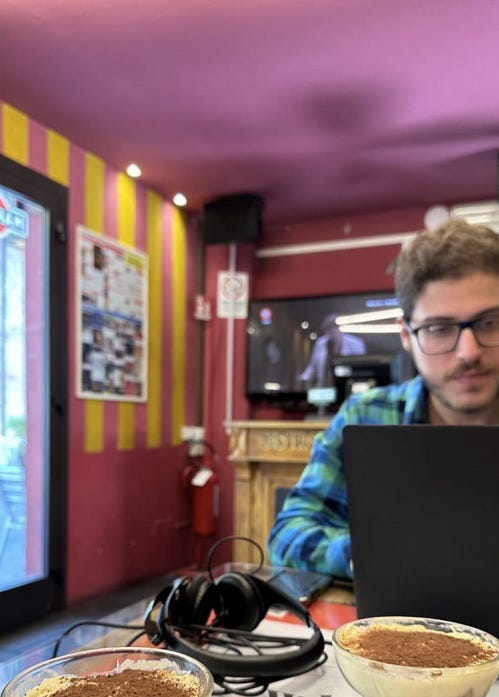How remote work allows for a 30+ exchange
While working remotely in Florence, be ready to be kicked out of a cafe
In today's edition, I invited the journalist Diego Moura, with whom I have been exchanging lengthy conversations about remote work for over a year, to share how he fulfilled his dream.
By Diego Moura
My teenage dream was to go on an exchange. However, time and money were off my side during that period. I had to preserve that desire away in the dark corner where we keep our frustrations, waiting to take them out one day. At the age of 31, that day came. And it was only possible thanks to remote work.
This experience made me even more devoted to Our Lord of the Remote Work and Saint Flexible Work. A supporter and advocate for a life that gives you the right to choose where (and often when) to perform your work efficiently —for both the employer and yourself.
Living for three months abroad and learning a language at 31 also showed me another fundamental concept: you are never too old to go on an exchange.
Location: Florence, Italy
I packed my bags and saved my finances heading for three months in the capital of the Renaissance, in the Tuscany region of Italy. Florence is incredible: you constantly stumble upon history and art just walking from the accommodation to school. The daily sight of the Duomo, a mega-construction completed in the 13th century with its revolutionary dome —the tallest building in Europe for decades—is surreal, inexplicable.
I arrived in August, five hours ahead of Brazil’s time. My work hours started at 2 pm (local time) and finished at 11 pm. The mornings were dedicated to Italian classes.
I spent the first two weeks understanding the logistics of living in a completely unfamiliar country in terms of culture and language. I was on vacation, which allowed me to marathon through museums, churches, and squares without a set time to return home.
However, it was time to return to reality after those two weeks. My primary concern when deciding on the exchange was to ensure accommodation with steady internet. I stayed at the house of Mrs. Margherita Martini, where I spent two of the three months in Italy. Sometimes, I had to use the internet from my cellphone.
Another crucial point is to have 24/7 phone connectivity without data restrictions. I chose Brasil Roaming and was already connected from Brazil. During the layover in Lisbon and the entire stay in Italy, there wasn't a single moment without connection (sometimes, in Florence, the signal in the historical center was a bit weak, but blame it on the towering buildings swallowing the narrow streets).
Furthermore, it's also essential to be prepared for unpredictabilities. When trying to access my company's network tools, everything was blocked. I discovered that my contract was less remote than I had imagined: after signing an addendum, I got my access granted to work outside Brazil.
Coworking and cafes
Unfortunately, Florence is unprepared to accommodate remote workers on a tighter budget. The coworking spaces I looked into had prices that didn't fit my budget —offering a robust structure, including meeting rooms, which I didn't need.
But what about cafes? When I chose Florence, I pictured myself working in a different cafe daily, with a different view for each meeting. Nothing could be further from my experience. Most establishments of this kind in the city are dependent on mass tourism. In the most unexpected places, you can imagine. Let me give you an example.
The cafe at the Biblioteca delle Oblate, overlooking the Cathedral of Santa Maria del Fiore, a postcard of Florence. Upon arrival, you are met with a sign prohibiting students from sitting at the tables (those who want to study should stay inside the library).
My wife, who joined me at the end of my second month of travel, and I went to this cafe to work. We spent a lot on the first day (over 30 euros each), with coffee, snacks, and sweets over five hours. The next day, when we returned, I hadn't even taken out my laptop when the manager was extremely rude, saying that the place was for people to eat and drink. I tried to argue with him but in vain. We had to leave. I complained about his behavior and found out that I should speak directly with the municipality of Florence, fill out forms, emails, etc. In three days, we would be back in Brazil. We gave up.
However, Caffè Le Murate was a pleasant surprise. We worked from there for several days. The cafe is built in the old Florentine prison building and has a library, a stage for shows, etc. A charming atmosphere, with friendly staff and a delightful wi-fi. On the last day, we were there, we had lunch, afternoon coffee, and, at the end of the day, took a pizza home.
I found Diego Moura's narrative that he was kicked out of a café impressive. I understand that some people might misuse such spaces, but there are ways to handle this issue. Implementing a usage fee, for example, could be a solution. Remote workers willing to pay such a fee could then fully appreciate the benefits of this third space.
In May, I wrote about how remote workers and cafe owners should be allies, not enemies. Read it.







I am surprised that this happened in Florence (which is so, so, so touristy) - a pity, but a reality for many remote workers in over-run, over-touristy places, where regular custom and clients, are not appreciated.